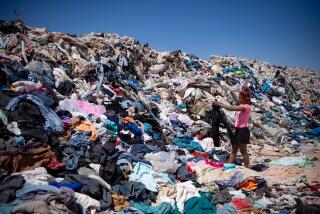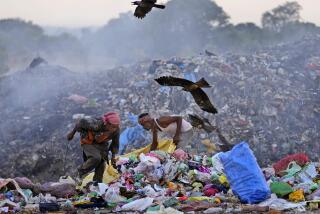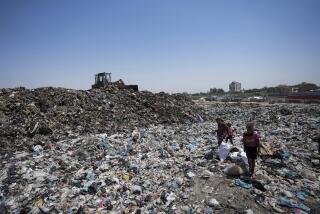Italians raising a stink over trash
PIANURA, ITALY — The smell, said Carmela Di Nardo, undulates sickeningly, a cross between rotten eggs, burned skin and dead animals. You try not to breathe very deeply. You keep your children inside.
“It smells worse than sewage,” Di Nardo said. “This is shameful.”
Here in Pianura, in nearby Naples and in more than a dozen other southern cities and towns, an estimated 100,000 tons of uncollected trash is rotting on the sides of roads and at apartment block doorsteps, poisoning the air, embarrassing the Italian government and empowering the local Mafia.
Two weeks ago, garbage collectors stopped picking up the trash because they said the region’s landfills were full. The garbage and angry protests have mounted steadily ever since.
The Naples area is a chaotic place in the best of times, but in recent days it has bordered on downright anarchy.
On Monday, in Pianura and neighboring San Giorgio a Cremano, trash was swallowing sidewalks, engulfing parks and blanketing bus stops with kudzu-like efficiency. In some spots, such as outside San Giorgio’s Villa Maria nursery school, piles were 5 or 6 feet high. Fetid walls of refuse were formed by orange peels and plastic bottles, Styrofoam crates and cardboard boxes, dead rats, soggy bread, broken tiles and, yes, the odd kitchen sink.
Enraged residents in the area have torched buses, upended cars, blocked streets, flung themselves on railway tracks and battled baton-wielding police. They have set dozens of fires, mostly in piles of rubbish, making their streets look as though they were dotted with funeral pyres. They hanged their local leaders in effigy, stringing up mannequins from lampposts.
The government accuses the local organized crime syndicate, known as the Camorra, of fanning the flames because it makes billions of dollars annually from illicit trash business.
Before dawn Monday, Prime Minister Romano Prodi sent the army into Naples to begin cleaning up and to force local authorities to open public schools after the Christmas break. Several Naples-area mayors said schools would be closed because children should not be obliged to wade through crud.
In fresh clashes in Pianura on Monday, at least three demonstrators were injured.
The townspeople are protesting not only the trash pileup but the government’s proposed solution: the reopening of a dump site on the outskirts of Pianura that was closed 11 years ago. Residents say the site is a toxic cesspool that emits cancer-causing poisons.
“It would be another Chernobyl if they reopen this,” said Giuseppina Buia, 39.
She, Di Nardo and a group of animated women were gathered down the road from the thickest demonstrations. They said the dump site gives off toxic gases and oozes sludge; they list the cancers and tumors they say their families have been cursed with. As they spoke, a convoy of Italian paramilitary police, following a bulldozer, drove by.
“We are mothers who just want fresh air for our children,” said Di Nardo, 40.
Getting rid of trash in Naples and other parts of southern Italy is a chronic crisis, in part because of official corruption and the involvement of the Camorra.
State prosecutors say the Camorra controls most of the dumps and transportation in southern Italy’s waste-disposal business. First, they say, the Camorra exacerbates the problem by illegally dumping industrial waste from northern Italy in southern sites. As those sites overflow, the syndicate steers more business to its illegal sites and to land Camorra members own that they then convert to dumps, with little regulation and huge fees.
“In this carefully orchestrated chaos, the Mafia always comes out on top,” said Environment Minister Alfonso Pecoraro Scanio.
Many residents, however, blame their own leaders as readily as they blame the Mafia.
Despite unusually high garbage-collection fees, plans to build incinerators and to enforce a recycling program never went beyond rhetoric, residents say. After years of crisis, a single incinerator is scheduled to go on line next year. And the government money that seemed available at one time has vanished -- “eaten” by officials, as one resident put it.
“We are between the hammer and the anvil,” moaned Michele Sabato, a retired sanitation inspector. “We are caught between the politicians and Camorra, and I don’t know which is worse. We are powerless.”
In San Giorgio, at Mario Improta’s vegetable stand, where his family has been selling tomatoes, melons and lettuce for 40 years, proprietor and customers were discussing in high-decibel voices and with many hand gestures the “tragedy” of their filthy streets. It has shamed them, they said, and hurt business.
“Good people come to our store; do you think they want to come out into this?” Improta said.
San Giorgio Mayor Domenico Giorgiano said city crews early Monday were able to remove several tons of rubbish from around schools, allowing them to open after all. The garbage was shoe-horned into a dump that had been closed because it was full, he said.
But parents were keeping their children home anyway, despite the prime minister’s insistence that school go ahead.
Already reeling from a string of narrowly survived no-confidence votes undermining his authority, Prodi held emergency meetings Monday and scheduled more for today. He also appeared mortified at the damage the crisis was doing to his nation’s image abroad.
The European Union officially rebuked Italy and is waving the threat of a lawsuit to punish the country for failing to meet EU standards governing the disposal of waste.
Opposition politicians eagerly demanded that heads roll. A major opposition party, the National Alliance, has plastered neighborhoods in Pianura with posters urging residents to resist compromise and to keep up pressure on the government.
Late Monday, with pressure mounting, like the trash, Prodi’s spokesman promised a “radical solution” within the next 24 hours.
More to Read
Sign up for Essential California
The most important California stories and recommendations in your inbox every morning.
You may occasionally receive promotional content from the Los Angeles Times.










